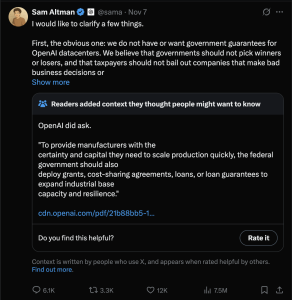OpenAI Plans Cloud Service Entry to Challenge Tech Giants
OpenAI CEO Sam Altman has revealed plans for a major new business venture that would position the ChatGPT maker in direct competition with cloud technology giants Google, Amazon, and Microsoft.
Key Takeaways
- OpenAI considering cloud services to compete with Microsoft Azure, AWS, Google Cloud
- Potential strategy to recover costs from $1+ trillion AI infrastructure investments
- Company clarifies it is not seeking government loan guarantees
In a recent post on X, Altman indicated OpenAI could soon begin selling cloud services, directly challenging established providers. This move comes as the company explores ways to finance its massive AI infrastructure commitments.
Financial Strategy Behind Cloud Expansion
OpenAI’s potential cloud service offering represents a strategic shift toward creating sustainable revenue streams. By renting out computing power, AI chips, and data center capacity to other companies, OpenAI could more efficiently recover costs from its substantial infrastructure investments.
“But everything we currently see suggests that the world is going to need a great deal more computing power than what we are already planning for,” Altman stated in his tweet.
This approach mirrors the successful cloud business models of Microsoft, Amazon, and Google, helping balance infrastructure expenses while addressing investor concerns about AI project returns.
Clarifying Government Loan Controversy
Altman’s cloud service revelation came alongside clarifications about comments made by OpenAI CFO Sarah Friar regarding potential government loan guarantees. At the Wall Street Journal’s Tech Live event, Friar had suggested government backing could “really drop the cost of the financing” for AI companies.
However, both executives later clarified that OpenAI is not seeking government support. Altman emphasized that taxpayers should not bear losses from corporate decisions, while Friar stated her comments were misinterpreted and that OpenAI is “not seeking a government backstop.”
The company’s potential cloud service entry represents a significant strategic expansion as it seeks to compete directly with the technology giants that have been both partners and competitors in the AI space.





